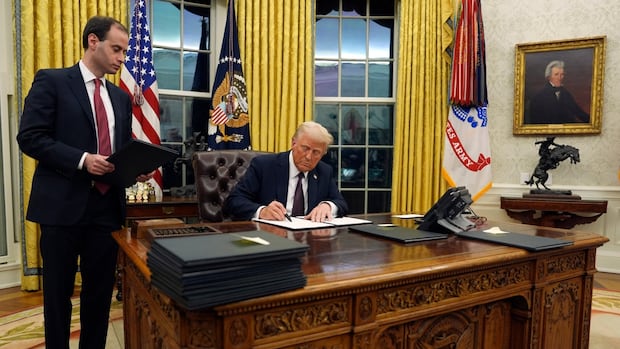US President Donald Trump signed an executive order postponing the nationwide ban on TikTok for 75 days on Monday, his first day back in office. But whether this move was legal is uncertain.
The ban, signed by the Biden administration and upheld by the Supreme Court, gave Chinese parent company ByteDance until Sunday to sell its shares in the popular social media platform or have it banned in the United States
Lawmakers on both sides had alleged that TikTok could be used by the Chinese government to spy on U.S. citizens.
But there is little evidence that Trump had the power to repeal the law.
“Executive orders cannot override existing laws,” said Sarah Kreps, director of Cornell University’s Tech Policy Institute.
The law includes a provision allowing a 90-day extension if progress has been made on a sale prior to the effective date. The app was disabled in the US on Saturday evening but was restored the next day, with a message to US users that the company was working with the Trump administration to find a solution.
Chinese social media app RedNote has come into the spotlight after more than half a million TikTok users recently joined the platform to protest a likely impending ban on the short-video app in the United States, which comes into effect on Sunday should occur. Technologist Jason Snyder says RedNote could “surveil or exploit users,” adding that the real danger lies in its “ability to control narratives.”
Kreps says it’s even less certain whether this provision can be applied retroactively because the law was already in effect when Trump signed his order.
“It is not clear whether the new president has the authority to extend a law that has already taken effect for 90 days,” she said.
She also doubts that the conditions for a delay exist at this point – without even a potential buyer having been named who could prove that a sale is moving forward. Various media reports pondered whether Tesla and SpaceX CEO Elon Musk would buy the platform or whether Mark Zuckerberg’s Meta would be interested in it.
Trump, who previously opposed TikTok’s presence in the US, told reporters he changed his mind after using the app himself.
In Canada and elsewhere, TikTok is now continuing as usual.
First Amendment issue
The Supreme Court viewed the TikTok ban as a First Amendment issue and examined whether the law violated TikTok or its users’ right to free speech, says Anupam Chander, a law professor at Georgetown University.
The court “does not assess the merits of the law. It does not judge the timing of the law. It just says, ‘Did Congress have the power to pass this law?'” he told CBC News.
Excitement with Elamin Abdelmahmoud25:00TikTok’s Uncertain Future and Severance Season 2
Ultimately, it found the law constitutional, citing congressional concerns about the app’s data collection.
Chander, an expert in regulating new technologies, says Trump’s postponement of the ban could be challenged in court. However, he adds, “It is not clear who would have the right to raise this challenge in U.S. courts.”
This is an example of the “danger” posed by executive orders.
“If you can say, ‘Hey, newspaper, you’re going to disappear and I can decide your fate in this country,’ that makes the newspaper very compliant, to say the least.”
This was part of a Supreme Court argument — in a separate, broader case about social media platforms — in July, when Florida and Texas argued that the government should limit those platforms’ regulation of the content posted by their users.

The court issued an opinion arguing that the platforms – like newspapers – should be protected from government interference when deciding what to include or exclude from the virtual space.
U.S. Rep. Frank Pallone, a New Jersey Democrat, has suggested Trump’s move was illegal, saying the newly sworn-in president was “circumventing national security laws passed by an overwhelming bipartisan majority in Congress.”
House Speaker Mike Johnson, a Republican, did not comment on the legality of Trump’s move but said he expected a full sale.
But Trump may have other plans, hinting to reporters on Monday that the administration could strike a deal with ByteDance to buy a 50 percent stake in TikTok. Whether Beijing, which has defended TikTok in the face of threats from the U.S., would entertain the idea is another potential obstacle.
And yet on Monday, China’s vice president met with US Vice President JD Vance and Musk after attending Trump’s inauguration, where TikTok boss Chew Shou Zi was also in attendance.
If a sale goes through, Chander said a partially U.S.-owned version of TikTok would likely be cut off from the rest of the world — similar to Chinese social media platform Douyin, a TikTok-like sister app that only operates in China is for a purely Chinese market.
That optic might not be good for the U.S., Chander says.
Douyin only operates in China because it is “a very heavily censored environment,” he said. “And that’s not what we normally do in the United States.”
“Canadians would talk to the rest of the world and Americans would talk to ourselves. This is not a good look for the United States and is not helpful for the rest of the world.”


